|
|
|
Sort Order |
|
|
|
Items / Page
|
|
|
|
|
|
|
| Srl | Item |
| 1 |
ID:
084225
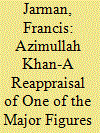

|
|
|
|
|
| Publication |
2008.
|
| Summary/Abstract |
The surviving documentation on Azimullah Khan is unreliable and fragmentary, but a survey suggests that his importance as a leader in the revolt of 1857 may have been exaggerated. His true distinction was as a consultant to the Nana Sahib. A unique personal letter from Azimullah, dating from the years that he spent in England and published here for the first time, reveals him at work behind the scenes on his master's behalf.
|
|
|
|
|
|
|
|
|
|
|
|
|
|
|
|
| 2 |
ID:
159714
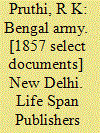

|
|
|
|
|
| Publication |
New Delhi, Life Span Publishers and Distributors, 2018.
|
| Description |
xxiv, 208p.hbk
|
| Standard Number |
9788183690058
|
|
|
|
|
|
|
|
|
|
|
|
Copies: C:1/I:0,R:0,Q:0
Circulation
| Accession# | Call# | Current Location | Status | Policy | Location |
| 059428 | 954.0317/PRU 059428 | Main | On Shelf | General | |
|
|
|
|
| 3 |
ID:
161638
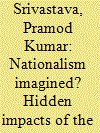

|
|
|
|
|
| Summary/Abstract |
This article challenges the myth that Indian nationalism was a major cause of the Rebellion or Uprising of 1857, arguing rather that nationalism was its ultimate result. But it goes much further, demonstrating that this unsuccessful Uprising of 1857 generated a new consciousness, as it taught Indians about the need to learn to protect and represent themselves better. While the East India Company (EIC) swiftly regained control and transferred sovereignty to the British Crown on 1 November 1858, tightening the noose of colonial subjugation for almost another century, the article argues that significant loss of trust in the feudal lords in 1857 opened the door to a new form of consciousness about the need for more competence in self-rule. The analysis suggests, therefore, that a combination of declining medieval feudalism and growth of modern nationalism in India, guided in due course by better equipped elite members of the middle classes, began to germinate as a largely hidden, unintended consequence of the failure of the 1857 Revolt, a phenomenon noted, but underrated, by historical scholarship.
|
|
|
|
|
|
|
|
|
|
|
|
|
|
|
|
| 4 |
ID:
192857
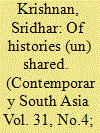

|
|
|
|
|
| Summary/Abstract |
While much has been written about how imperialist and Indian nationalist historiographies have approached 1857, scant attention has been paid to how it has been remembered in Pakistan. This article endeavours to explore the ways in which 1857 has been articulated by the state in India and Pakistan through a study of their commemorative postage stamps. On the face of it, India's emphasis on nonviolence and Pakistan's quest for an Islamic history make 1857 a misfit within the historiographies of both states. However, the paper outlines that during the centenary in 1957, both India and Pakistan commemorated 1857 while maintaining some discursive distance from it. While Pakistan chose to memorialise it as the beginning of its struggle for independence, India recessed it within the broader framework of independence itself. The paper goes on to demonstrate how this position has changed drastically over the years. In order to weave a composite and inclusive history of the country, India now celebrates the legacy of 1857 by appropriating it within the frames of national unity, patriotism, and anti-imperialism. Pakistan, on the other hand, uses 1857 merely as a means to segue into a discussion of reform efforts led by the subcontinent's Muslim elite, thereby relegating it to the background of the Pakistan movement.
|
|
|
|
|
|
|
|
|
|
|
|
|
|
|
|
| 5 |
ID:
117133
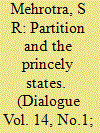

|
|
|
|
|
|
|
|